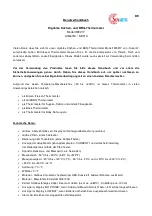
3
EN
www.napoleon.com
www.napoleon.com
N415-0580 Sep 17.19
N415-0580 Sep 17.19
WARNING!
Failure to follow these instructions could result in property damage, personal injury or
death. Read and follow all warnings and instructions in this manual prior to operating grill.
!
Safe Operating Practices
•
This gas grill must be assembled exactly according to the instructions in the manual. If the grill was store
assembled, you must review the assembly instructions to confirm correct assembly and perform the
required leak tests before operating the grill.
•
Read the entire instruction manual before operating the gas grill.
•
This gas grill must be used only outdoors in a well-ventilated space and must not be used inside a building,
garage, screened-in porch, gazebo or any other enclosed area.
•
This gas grill must not be installed in or on recreational vehicles and/or boats.
•
Do not locate unit in windy settings. High winds adversely affect the cooking performance of the gas grill.
•
Under no circumstances should this gas grill be modified.
•
Do not operate unit under overhead combustible construction.
•
Maintain proper clearance to combustibles 26” (661mm) to rear of unit, 10” (254 mm) to sides). Additional
clearance is recommended near vinyl siding or panes of glass.
•
Gas must be turned off at the propane cylinder or at the natural gas supply valve when the gas grill is not in
use.
•
Do not attempt to use a cylinder that is not equipped with a QCC1 type connection.
• When the propane cylinder is connected to the appliance, the gas grill and cylinder must be stored
outdoors in a well-ventilated space.
•
When the gas grill is to be stored indoors, the connection between the propane cylinder and the gas grill
must be disconnected and the cylinder removed and stored outdoors in a well ventilated space out of reach
of children. Disconnected cylinders must not be stored in a building, garage or any other enclosed area.
Natural gas units must be disconnected from the supply when being stored indoors.
• The pressure regulator and hose assembly supplied with the outdoor cooking gas appliance must be
used. Inspect the supply hose before each use. If there is evidence of excessive abrasion or wear or the
hose is cut, it must be replaced prior to using the gas grill with a replacement pressure regulator and hose
assembly specified by the grill manufacturer.
•
Do not route hose underneath drip pan - proper hose clearance to bottom of unit must be maintained.
•
Leak test the unit before initial use, annually, and whenever any gas components are replaced.
•
Follow lighting instructions carefully when operating grill.
•
Burner controls must be off when turning supply cylinder valve on.
• Adults and especially children should be alerted to the hazards of high surface temperatures. Young
children should be supervised near the gas grill.
•
Do not leave grill unattended when operating.
• Do not light burners with lid closed.
•
Do not operate rear burner with main burners operating.
•
Do not move grill when hot or operating.
•
Do not use condiment tray to store lighters, matches or any other combustibles.
• Keep any electrical supply cord and fuel supply hose away from any heated surfaces.
•
Ensure sear plates are positioned properly according to sear plate installation instructions.
•
Clean grease tray and sear plates regularly to avoid build-up, which could lead to grease fires.
•
Inspect infrared burner venturi tube for spider webs and other obstructions periodically. Clean the tubes
completely if you find any such obstructions.
•
Do not allow cold water (rain, sprinkler, hose, etc.) to come in contact with heated unit. A large
temperature differential can cause chipping in the porcelain.
•
Do not allow cold water (rain, sprinkler, hose, etc.) to come in contact with ceramic burners.
• Do not use a pressure washer to clean any part of the unit.




































